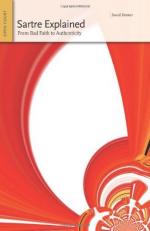|
This section contains 683 words (approx. 3 pages at 300 words per page) |

|
The most common form of inauthenticity in the existentialism of Jean-Paul Sartre, "bad faith" is paradoxically a lie to oneself. For such self-deception to be possible, the human being must be divided against itself, one level or aspect concealing from the other what it in some sense "knows." The paradox arises from the condition that this operation occurs within the unity of a single consciousness.
The root of Sartrean bad faith is a twofold dividedness of the human being, psychological and ontological. As conscious, humans are prereflectively aware of what they may not reflectively know. Such prereflective awareness or "comprehension," as he will later call it, functions in Sartre's psychology in a manner similar to Sigmund Freud's unconscious, a concept that Sartre notoriously rejected. The project of bad faith—to keep oneself in the dark about certain matters—is itself in bad faith since prereflective consciousness...
|
This section contains 683 words (approx. 3 pages at 300 words per page) |

|


